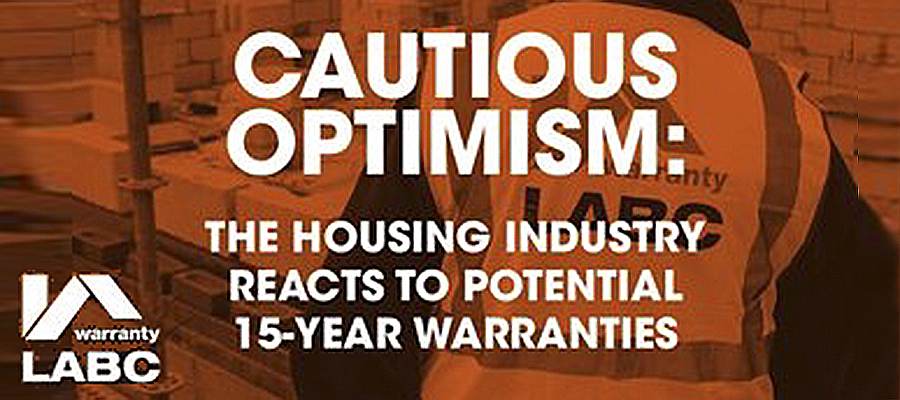Mandatory 15 year warranties on new homes supported with caution
An LABC Warranty survey has found that while the majority of those in the housing industry are unaware of the potential for minimum 15-year structural warranties to be introduced by law, they are optimistic about the effects of that change.
The Building Safety Act, introduced in April 2022, brings generational change to the UK's construction industry. The Act introduces new regulations, enforcement mechanisms regulatory bodies, and enhanced powers for these regulators.
Significantly, it also includes provisions that will make structural warranties legally mandatory for the first time.
The survey, which drew responses from housebuilders and developers, designers, building control professionals, consultants, contractors, self-build, social housing provider, and homeowners focused on two aspects of the proposed legislation:
Minimum 15-year warranties. The legislation, if triggered by secondary regulations, would establish a new standard of 15-year minimum coverage for structural warranties. Currently, most warranties span 10 years, with certain exceptions.
All new-home coverage. The new legislation, if activated, would also make it mandatory for all new-build homes to be covered by a structural warranty. Presently, no statutory requirement mandates warranty coverage for new build homes.
LABC Warranty's survey set out to discover the awareness level for the above legislative changes, and the level of support these changes have among existing structural warranty customers and readers of their technical content.
The survey shows that:
- 64% of respondents were unaware of the proposal to extend the standard 10/12-year warranty term to 15 years.
- 53% were unaware of a proposal to make warranty cover a legal requirement for all new homes.
Despite this:
- 60% of respondents are in favour of extending warranties from 10/12 years to 15 years.
- 58% believe mandating warranties would lead to better standards of safety, or improved customer satisfaction.
- Overall, 40% believed there would be a positive outcome if all warranty-related secondary legislation came into force, 23% believed it would lead to a negative outcome, and 37% believed it would lead to a mixed result.
Only 5% of respondents said they had prepared for the secondary legislation to be enacted.
Reasons in support of longer warranty periods included improved standards (46%), better protection for homeowners (41%) and alignment with the Defective Premises Act liability period (10%). Lack of need (56%) and increased cost (37%) were the main reasons for those against.
Building control practitioners were most in support of the extended term (92%) while housebuilders/developers were most against (67%).
LABC Warranty commented: "Even respondents who offered a broadly positive outlook had reservations about potential negative effects of the legislative changes discussed. Given this and the strength of feeling shown through comments, LABC Warranty would describe the response as a very cautious optimism while we await more details on any upcoming secondary legislation."
This article appears on the CIAT news and blogsite as "Industry 'cautiously supports' mandatory 15-year warranties on new homes" dated September 12, 2023.
--CIAT
[edit] Related articles on Designing Buildings
- Agency.
- Bonds.
- Bonds v guarantees.
- Breach of contract.
- Building Safety Act.
- Building safety bill.
- CIAT raises concerns about Building Safety Bill.
- CIOB responds to Newsnight report - Trapped: the UK's building safety crisis.
- CIOB reviews the Building Safety Bill.
- Collateral warranties.
- Defects.
- Definition of collateral warranty.
- Difference between collateral warranties and third party rights.
- Duty.
- Fire safety bill.
- Fit for purpose.
- Golden thread.
- Grenfell Tower fire.
- Grenfell Tower Inquiry.
- Guarantees.
- Hackitt Review.
- Insurance.
- Miller Act.
- Performance bond.
- Practical considerations of collateral warranties.
- Professional consultant's certificate.
- Reasonable skill and care.
- The Building Safety Bill and product testing.
- The Building Safety Bill - A Quality Response.
- The Building Safety Bill, regulations and competence.
- The golden thread and BS 8644-1
- Warranty.
Featured articles and news
UKCW London to tackle sector’s most pressing issues
AI and skills development, ecology and the environment, policy and planning and more.
Managing building safety risks
Across an existing residential portfolio; a client's perspective.
ECA support for Gate Safe’s Safe School Gates Campaign.
Core construction skills explained
Preparing for a career in construction.
Retrofitting for resilience with the Leicester Resilience Hub
Community-serving facilities, enhanced as support and essential services for climate-related disruptions.
Some of the articles relating to water, here to browse. Any missing?
Recognisable Gothic characters, designed to dramatically spout water away from buildings.
A case study and a warning to would-be developers
Creating four dwellings... after half a century of doing this job, why, oh why, is it so difficult?
Reform of the fire engineering profession
Fire Engineers Advisory Panel: Authoritative Statement, reactions and next steps.
Restoration and renewal of the Palace of Westminster
A complex project of cultural significance from full decant to EMI, opportunities and a potential a way forward.
Apprenticeships and the responsibility we share
Perspectives from the CIOB President as National Apprentice Week comes to a close.
The first line of defence against rain, wind and snow.
Building Safety recap January, 2026
What we missed at the end of last year, and at the start of this...
National Apprenticeship Week 2026, 9-15 Feb
Shining a light on the positive impacts for businesses, their apprentices and the wider economy alike.
Applications and benefits of acoustic flooring
From commercial to retail.
From solid to sprung and ribbed to raised.
Strengthening industry collaboration in Hong Kong
Hong Kong Institute of Construction and The Chartered Institute of Building sign Memorandum of Understanding.
A detailed description from the experts at Cornish Lime.

























